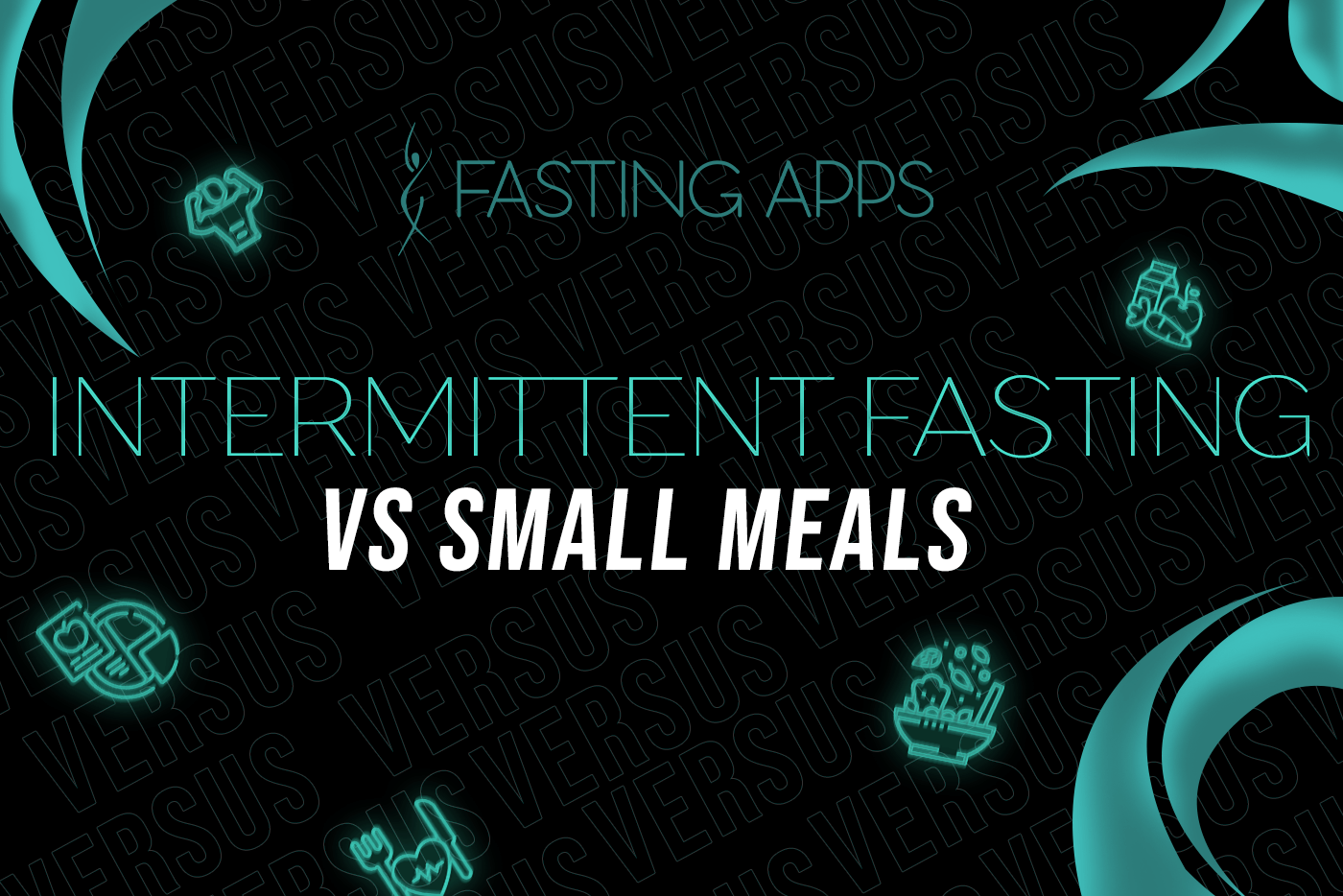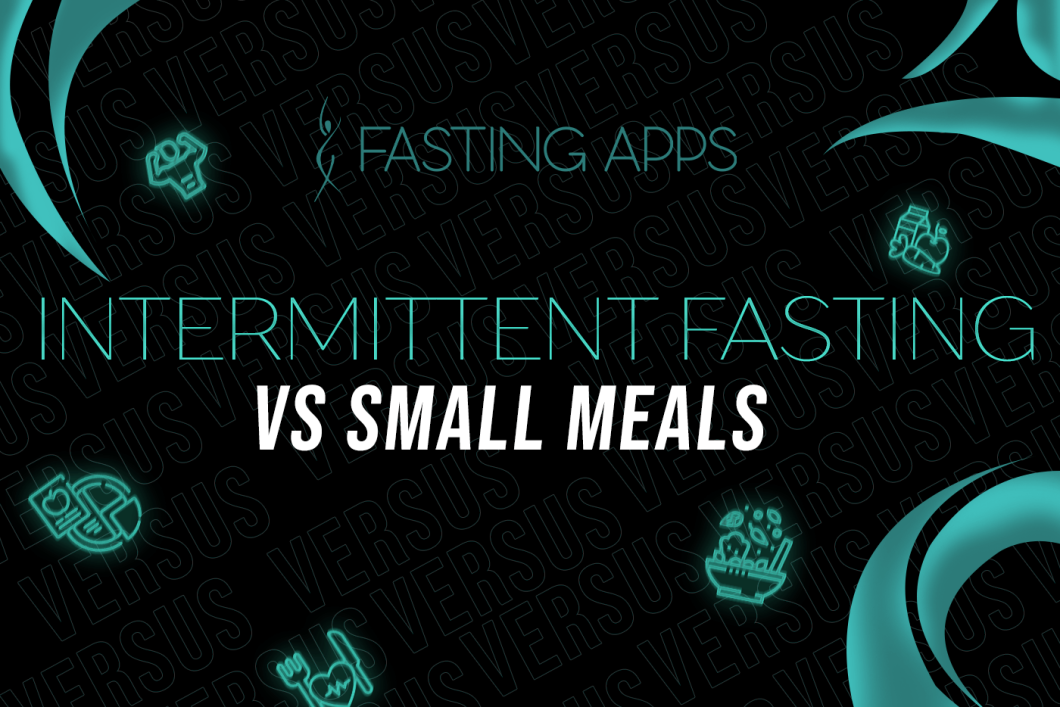Intermittent Fasting vs Small Meals
Written by Andrew Brewer. ⚕️Reviewed and fact checked by our medical team.

There are so many different weight loss plans out there that it can be impossible to know how to choose the right one for you. Intermittent fasting is one of the newest diets, but it’s far more than that. Studies have shown the health benefits surpass weight loss, which is why it’s growing in popularity.
Eating small meals is another common choice that’s thought to boost your metabolism. Unfortunately, that’s not the case, but that doesn’t mean there’s not a time and a place for eating small meals. Let’s explore the difference between these two plans to help you narrow it down.
Key Takeaways
Intermittent fasting has numerous health benefits beyond weight loss, including improved blood sugar, cholesterol, and cortisol levels, reduced risk of diseases like cancer and heart disease, and increased longevity.
Eating small meals throughout the day can help control hunger and maintain steady energy levels, but it does not have a significant impact on metabolism or allow the gut to rest.
When choosing between intermittent fasting and eating small meals, consider your lifestyle, preferences, and goals. Intermittent fasting may be more beneficial for those looking to maximize their health and well-being, while small meals may be more feasible for those with busy schedules.
It is important to consult with a healthcare professional before starting any new diet plan to ensure it is safe and effective for you.
Both intermittent fasting and small meals can be effective for weight loss, but it is important to focus on high protein, fiber, and healthy fat foods for sustained nutrition during intermittent fasting, and to plan small meals carefully to ensure the right nutritional balance and prevent overeating.
Benefits of Intermittent Fasting
Intermittent fasting has been around for a long time, and there’s no sign of it going away anytime soon - and that’s a good thing! One of the biggest benefits of intermittent fasting is weight loss. When your body runs out of calories, it burns fat. That would be beneficial enough, but when you reach autophagy, your cells regenerate. Additionally, your blood sugar, cholesterol, and cortisol lower, causing less stress on your body. Your longevity will improve because you reduce your risk of catching diseases like cancer and heart disease. Intermittent fasting can change your life if you follow the plan and don’t cheat.
Benefits of Small Meals
So many of us learned that you eat three meals a day, but often that doesn’t fit in our lifestyles. Small meals throughout the day can help power you through the day and make sure you don’t overeat during mealtimes. You never feel hungry because you are constantly eating. Too, you’ll feel less tired because your energy levels are more steady. You’ll lose weight without compromising muscle mass, especially if you work out. Small meals should be planned to ensure you’re getting the right nutritional balance. Limit any empty calories or high-fat food to prevent any energy crashes.
What are the Differences?
Let’s explore the key differences between intermittent fasting and eating small meals.
Diet
Intermittent fasting limits your eating to windows throughout the day or the week. For the best results, focus on high protein, fat, and fiber foods. This will provide sustained nutrition throughout your fast while still pushing your body to burn fat. You will feel hungry during intermittent fasting until your body adjusts to the new schedule.
When you eat small meals throughout the day, you never feel hungry. You are constantly eating, fueling your body with calories and energy. The thought is that you would eat less, but you need to be planful about what you eat during intermittent fasting. If you eat high-protein meals, you’ll feel less hungry. If not, you can easily overeat if you’re not careful.
Metabolism
One of the most common misconceptions is if you eat more often, you will boost your metabolism. This is not true. Small meals have no impact on boosting your metabolism, but intermittent fasting can. Studies suggest that intermittent fasting can boost your metabolism, helping you burn through your food quicker so you can move toward your fat stores. More research is needed to determine how much.
Gut Rest
Constant eating doesn’t allow your gut to rest, which can cause digestive issues. Bloating, constipation and diarrhea can all be treated by resting your intestines, and intermittent fasting can help you do that. Eating small meals will not. Your stomach constantly needs to process food, so it is constantly irritated.
How to Choose?
Your lifestyle plays a huge role in which diet plan will work best for you. If you’re looking to only lose weight, then either will do. However, if you are looking to maximize your health and well-being, getting benefits that far surpass weight loss, then you may want to try intermittent fasting.
Our #1 Recommendation: DoFasting
It's easily one of the best intermittent fasting apps that offers plenty of features for anyone!
Use coupon code: 10app to get an extra 10% off all memberships.
FAQ
What are the benefits of intermittent fasting?
Intermittent fasting has been associated with several health benefits, including weight loss, improved blood sugar control, increased insulin sensitivity, reduced inflammation, and improved heart health.
What are small meals?
Small meals refer to eating several small portions of food throughout the day rather than three large meals.
What are the benefits of small meals?
Eating small, frequent meals can help regulate blood sugar levels, prevent overeating, and provide a steady energy supply throughout the day.
Is intermittent fasting better than small meals for weight loss?
There is no one-size-fits-all answer to this question. Both approaches can be effective for weight loss, and the best approach for you may depend on your individual preferences and lifestyle.
Can intermittent fasting be harmful to my health?
Intermittent fasting can be safe for most people, but it is not recommended for pregnant women, people with certain medical conditions, or those with a history of disordered eating.
Is it necessary to follow a strict fasting schedule with intermittent fasting?
No, there is no one-size-fits-all approach to intermittent fasting. Instead, you can choose a fasting schedule that suits your lifestyle and preferences.
Can I eat whatever I want during my eating periods with intermittent fasting?
While there are no strict rules about what to eat during your eating periods, it is still important to make healthy choices and ensure you get all the nutrients your body needs.
Should I consult a healthcare professional before trying intermittent fasting or eating small meals?
It is always a good idea to consult with a healthcare professional before significantly changing your diet or lifestyle, especially if you have a medical condition or are taking medications.

